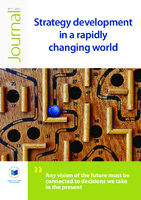Strategy developmentin a rapidlychanging world

journal
Συγγραφέας
European Court Of Auditors
Ημερομηνία
2021-05-06Προβολή/
Θεματικές επικεφαλίδες
Economic affairs and Digital Transformation ; Stratery Development ; Age of DisruptionΠερίληψη
Action instead of talking!’ That is what my late father used to say. At the same time, talking about what you want to do and how to do it best is also important. Even more so in today’s world, which is driven by technological innovations (see pages 8 and 13) but characterised by major disruptions and seemingly uncontrollable events, such as climate change or the COVID-19 pandemic. Being prepared for what may come has perhaps become more difficult, but also more necessary. We have to be resilient. Getting a clear perspective on what you – as a person, or as part of a team, an organisation, a business, or of society – want to achieve to be ‘future proof ’ or ‘fit for purpose’ requires a strategy. Otherwise, you may soon be in the business of firefighting, reacting rather than managing the change.The idea of public sector organisations making conscious choices about their strategic orientation, above and beyond applying their mandate, is a recent one. In this process, citizens’ needs have come more to the fore. So have foresight and scenario planning, approaches which make us think systematically about the future and possible solutions, informing and targeting decisions made in the present while offering the added resilience of alternative scenarios, should things not turn out as foreseen (see pages 19, 24, 193 and 200). Public sector organisations, in whatever form, are affected, if not steered, by politics. And politics is about future. Who wants to talk about the past if we can only change the future? But often the discussion quickly focuses on the what and the how instead of the why of strategic choices, although a discussion of the why is crucial to gathering support for the efforts needed to reach the goals set and pay the bill. Examples are measures relating to climate change or industrial transformation towards the jobs of tomorrow. People are most afraid of things they do not understand; then they tend to fall back on assumptions, with the risk of polarisation lurking just around the corner.
Αριθμός σελίδων
236p.Γλώσσα
ΑγγλικάΣημείωση
https://www.eca.europa.eu/lists/ecadocuments/journal21_01/journal21_01.pdfNo 1 | 2021
